How to use quizzes to grow your e-commerce store: 10 strategies, examples, and templates
Learn how to use quizzes to grow your e-commerce store with 10 proven strategies, real brand examples, and ready-to-use templates.
.webp)
If you’ve ever felt like your e-commerce store is shouting into the void—hoping someone will hear, click, and buy—you’re not alone. Customers are overwhelmed with choices. Engagement is harder than ever. And let’s not even get started on personalization…or the lack of it.
That’s where quizzes come in. They can:
- Turn browsers into buyers by delivering personalized product recommendations
- Increase engagement through interactive content
Collect zero-party data (ZPD)—data customers willingly share with you—to sharpen your marketing strategies
The best part?
From boosting conversions to building loyalty, quizzes can do it all. If you’ve ever wondered how to use quizzes for e-commerce, here are 10 creative ways:
1. Product recommendation quizzes
With so many choices, shopping online can feel overwhelming, but a product recommendation quiz takes some of the stress out of decision-making. Think of it as a virtual personal shopper—a few simple questions to help customers find exactly what they need.
For example, a skincare brand might offer a quiz called “Find Your Perfect Routine.” Shoppers answer questions about skin type, concerns, and daily habits to get guidance on the right serums and moisturizers. As a result, customers feel understood and confident in their purchase—and they’re more likely to connect with a product they’ll love (and maybe even repurchase).
Pro tip: Stay connected with customers. If a shopper’s quiz results show they need hydration products, follow up with personalized emails featuring complementary items like sheet masks or gentle cleansers.
2. Seasonal gift guides
During the holidays, your customers juggle long to-do lists, tight budgets, and that familiar gift-giving anxiety.
Enter the seasonal gift guide quiz: a way to help turn their stress into a fun, personalized shopping experience. It not only helps them find the right gift but also makes your store the easy choice.
Picture this: A jewelry retailer rolls out a “Which Gift Matches Their Style?” quiz. With just a few simple questions—like “Are they classic or modern?” “Gold or silver?” “What’s your budget?”—the quiz serves up tailored recommendations from their collection. Suddenly, choosing the perfect gift doesn’t feel like a chore—it feels effortless. And when you make shopping this simple, customers trust you with their holiday list and may even come back for more.
Pro tip: Follow up with perks like free gift wrapping or a limited-time holiday discount to sweeten the deal. Make their experience so seamless they’ll wonder why they didn’t shop with you sooner.
3. Personality-based product matches
People don’t just buy products—they buy personalized experiences and positive emotions. That’s why personality-based quizzes are so powerful. By helping customers see themselves in your products, these quizzes turn “maybe” into “yes” and casual interest into lasting loyalty.
Picture this: A fragrance brand rolls out a “What’s Your Scent Personality?” quiz. The questions are quick but intentional—“Are you adventurous or laid-back? Do you love crisp mornings or warm evenings?”—and t The results are more than a product suggestion—they’re a story. Instead of just recommending a citrus scent, the quiz tells the customer, “You’re bold, bright, and always on the move—this fragrance was made for you.”
Now, it’s not just a perfume, it’s their perfume.
4. Style or taste quizzes
With personal style, customers want to feel confident they’re making the right choice. A style or taste quiz turns a sea of decisions into a clear path, so your customers can see exactly how your products suit them.
For example, Havenly, a furniture retailer, offers a “What’s Your Interior Design Style?” quiz. Are their customers into mid-century modern minimalism, or do they love the cozy warmth of farmhouse chic? By asking about favorite colors, room usage, and preferred textures, the quiz narrows down options to a curated selection of furniture and decor that perfectly matches their vibe.
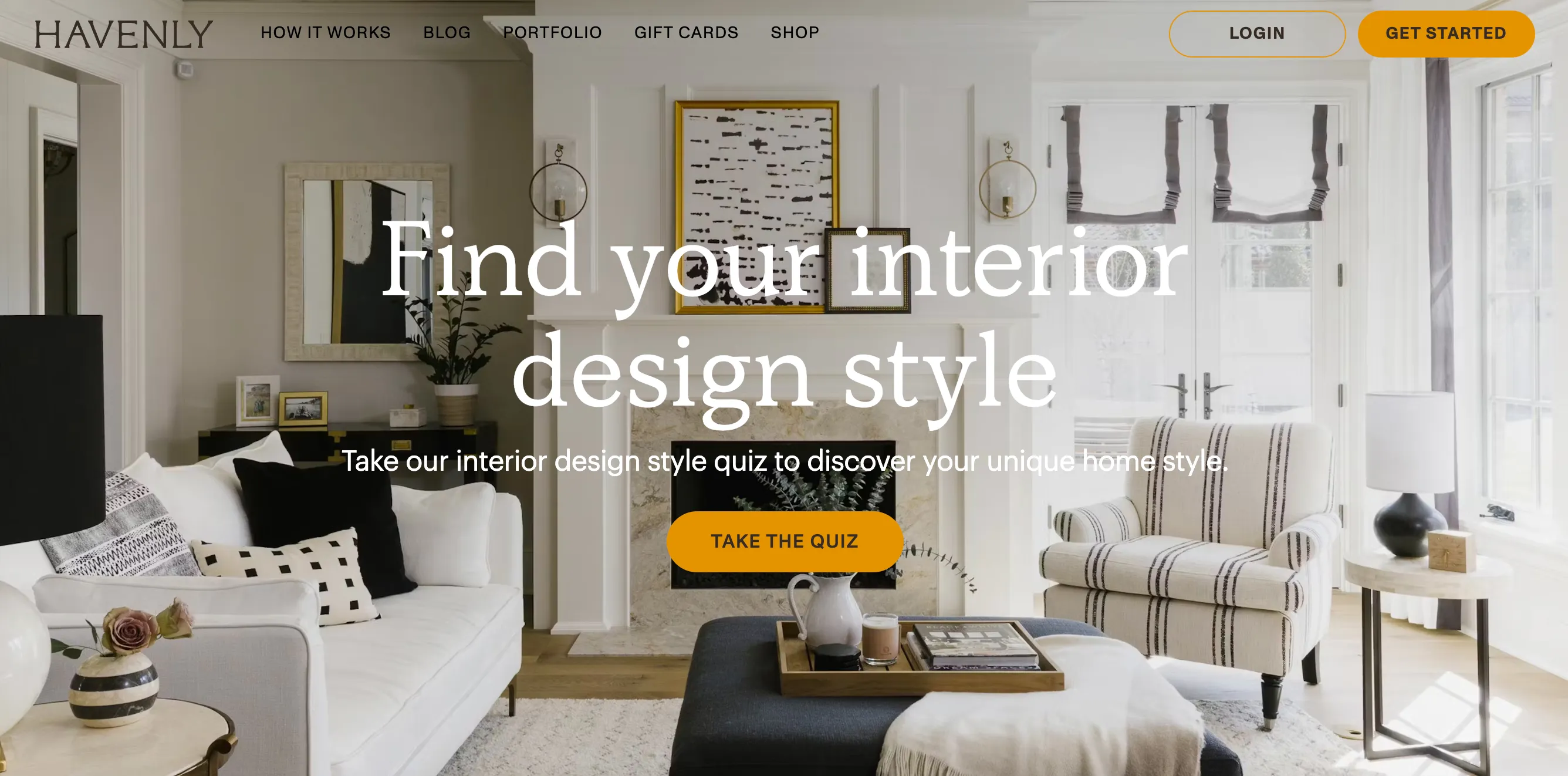
The magic here isn’t just in the recommendations—it’s in removing the overwhelm. Instead of browsing endlessly through dozens of sofas, your customer feels like they’ve found the one that reflects their taste.
5. Discount unlock quizzes: make saving fun
Let’s face it—everyone loves a discount. But what if getting that deal wasn’t just about saving money? What if it became part of the experience? That’s the magic of a discount unlock quiz. It turns a simple promotion into something interactive and engaging, giving customers a sense of accomplishment and a reason to click “Buy.”
Take Fabletics, for example. Their “What’s Your Workout Style?” quiz helps shoppers determine the activewear that fits their vibe—whether they’re into yoga, running, or high-intensity workouts. They get personalized recommendations and a special discount on their first purchase. The whole experience feels personal, rewarding, and way more exciting than a pop-up code.
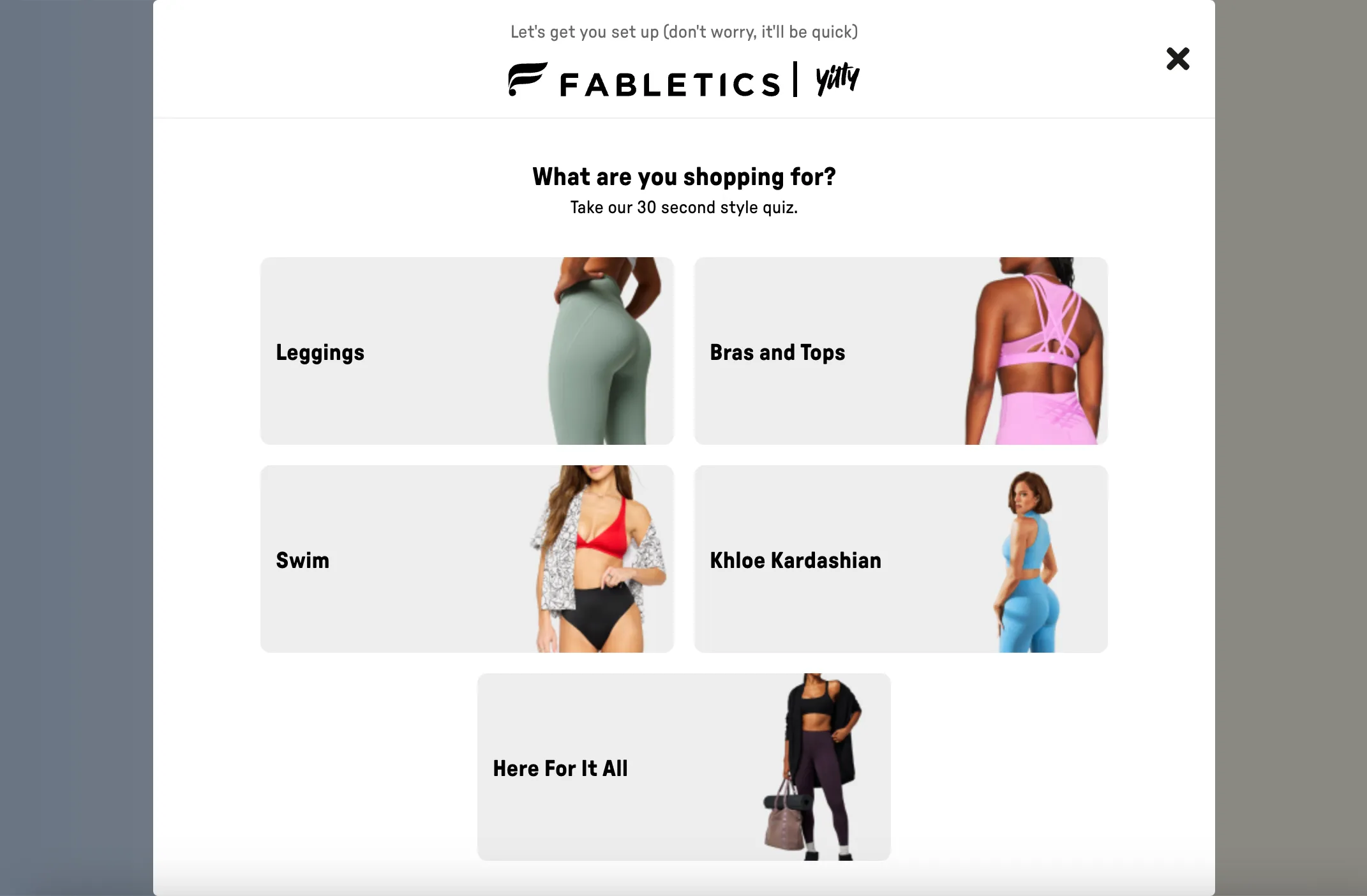
Why it works: Shoppers feel like they’ve earned their deal. And that small sense of achievement? It can be just the nudge they need to hit checkout.
6. Subscription plan match quizzes
Subscriptions are gold for e-commerce—predictable revenue and loyal customers—but for shoppers, deciding on a plan can feel like a chore. A subscription plan match quiz fixes that. It simplifies the decision-making process, making customers feel confident and cared for, right from the start.
Take Dollar Shave Club. Their “What’s Your Shave Style?” quiz asks a few quick questions about shaving frequency, skin type, and preferences. Then, it matches you with your ideal subscription plan—whether it’s monthly razor or skincare.
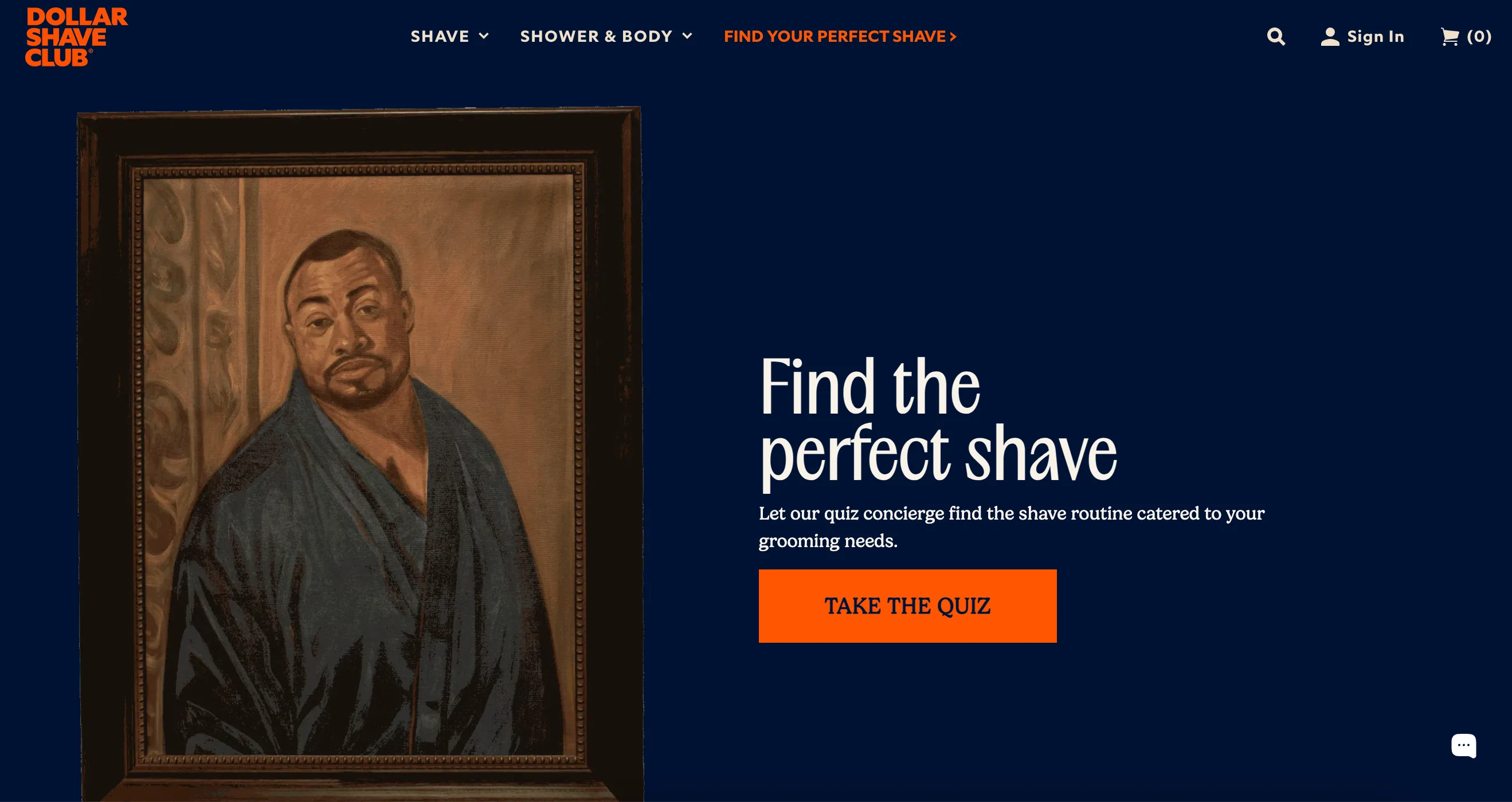
7. Post-purchase quizzes: keep the conversation going
Checkout isn’t the end—it’s the beginning of building loyalty. A post-purchase quiz keeps the connection alive by offering tailored advice, upsells, and a sense that you truly care.
Take Curology, a skincare subscription brand. After customers receive their products, they’re invited to a “How’s Your Routine Working?” quiz. It asks about changes in their skin, how often they’ve used the product, and any new concerns. Based on answers, Curology suggests tweaks—like formula adjustments or add-ons—and shares tips for better results.
The impact? Customers feel supported, not sold to, turning one-time buyers into loyal fans.
Pro tip: Use quiz insights to craft follow-ups, like “We noticed [Product X] might complete your routine—here’s a discount just for you.” Simple, personal, effective.
8. Quiz-based lead magnets: turn curiosity into connections
Generic email signups are a hard sell (and often a hard no). A quiz-based lead magnet can make all the difference. Instead of just asking for an email, you’re offering an engaging, personalized experience—one that naturally leads to signups.
For example, Warby Parker’s “Find Your Frames” quiz helps shoppers pick glasses that match their style and face shape. At the end, customers can save their results and try frames at home by providing their email. It’s a win-win: customers get a tailored recommendation, and Warby Parker builds a list of engaged leads to follow up with.
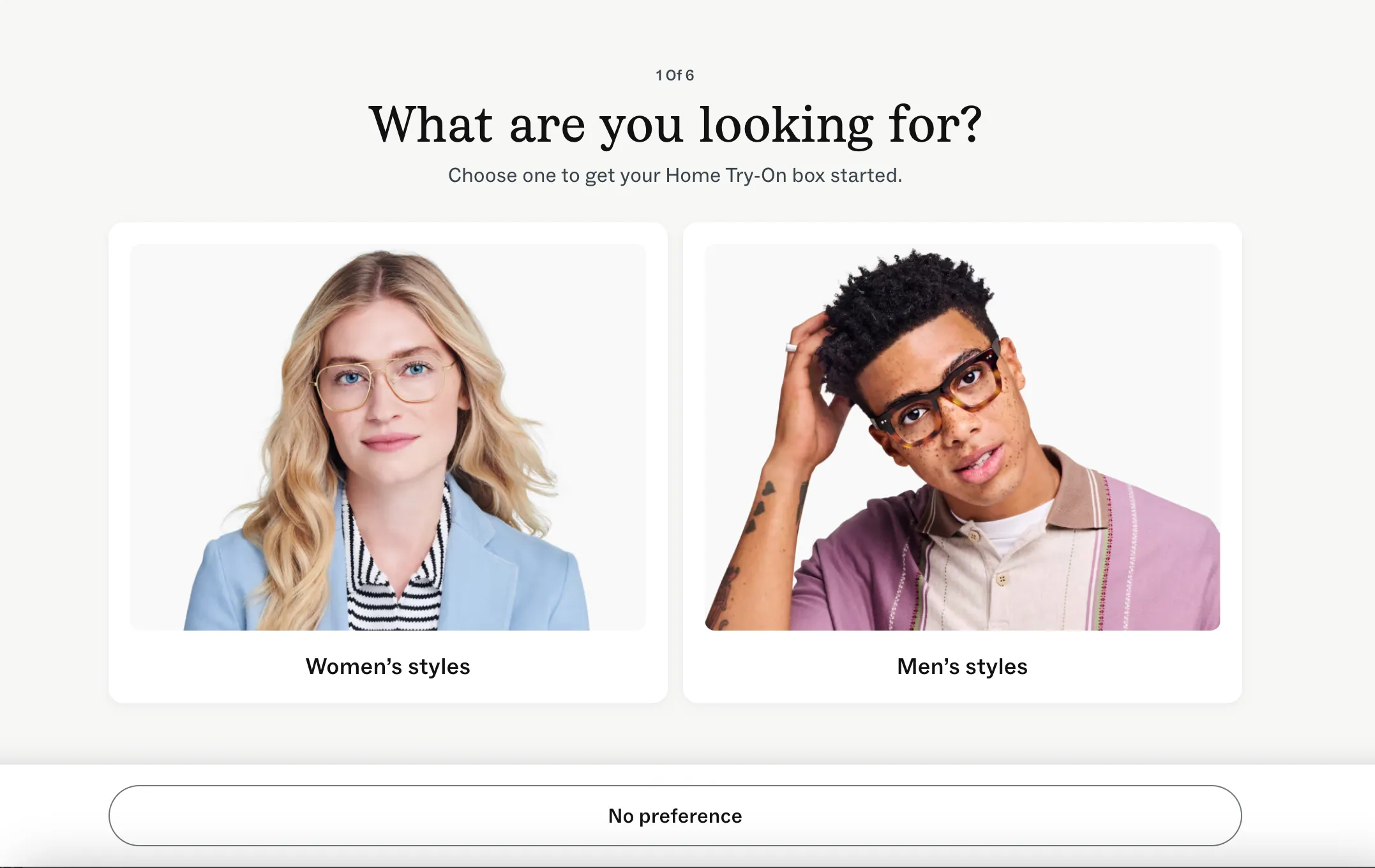
9. New product discovery quizzes: spotlight what’s new
Got a new product? A quiz is the perfect way to introduce it. Instead of overwhelming customers with announcements, you make product discovery feel personalized and fun.
For example, Glossier’s “Find Your Perfect Shade” quiz helps you explore new additions to their makeup line.
When they launched a range of stretch concealers, the quiz walked shoppers through questions about skin tone, undertone, and coverage needs.
The result?
A perfectly matched shade from the new collection, paired with recommendations for other complementary products.
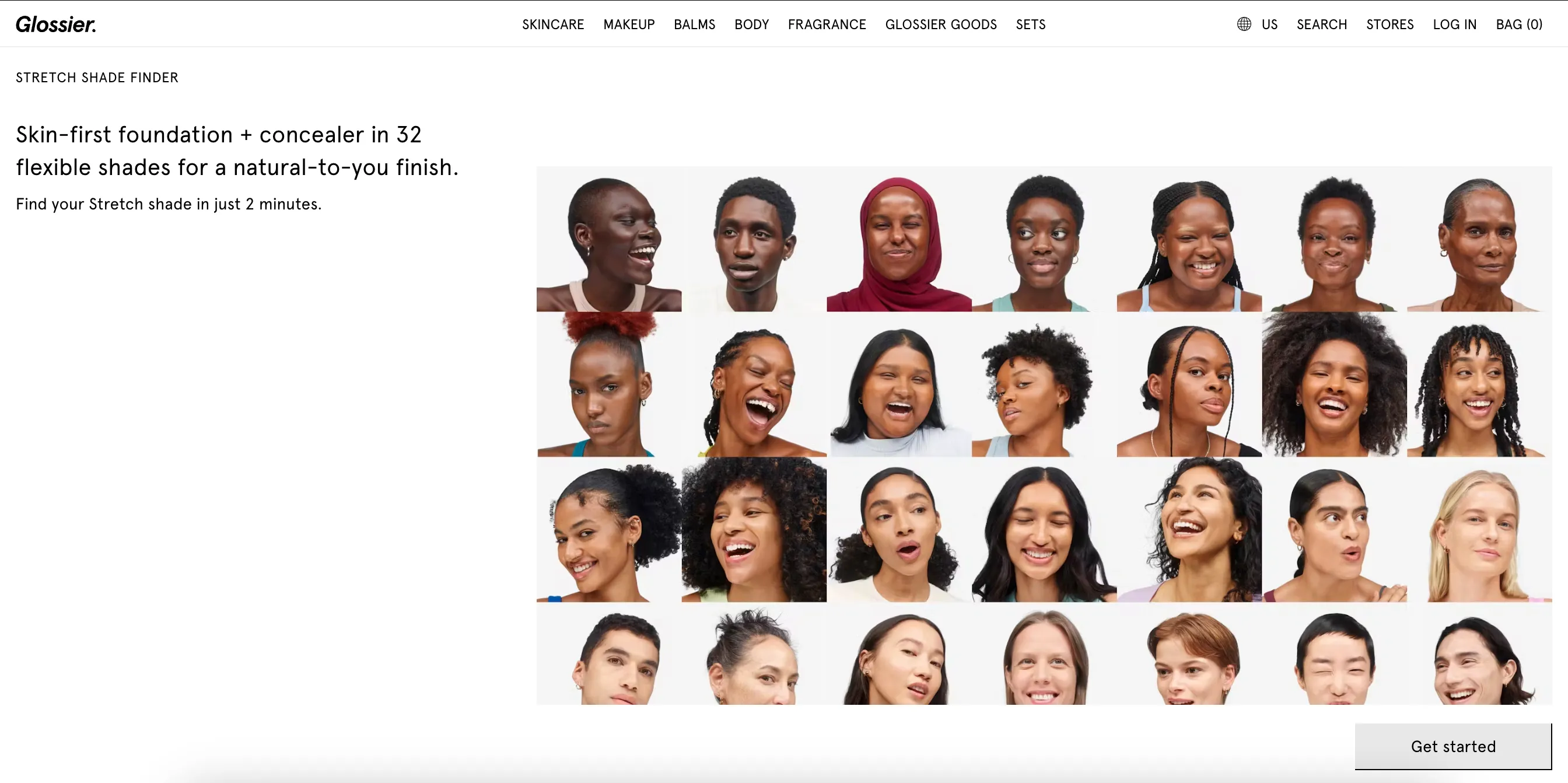
10. Customer education quizzes: build trust through knowledge
Sometimes, the best way to sell a product is to help customers understand it first. That’s where an education-focused quiz comes in. By answering questions and offering tailored insights, you position your brand as an expert while empowering customers to make informed decisions.
Take Sephora’s “Skincare Routine Builder” quiz as an example. The quiz guides customers through questions about skin type, concerns, and goals. Then, it explains how different products—cleansers, serums, and moisturizers—work together to create a personalized regimen. Customers not only get recommendations but also learn why each product is essential for their needs.
Why it works: Customers who understand how a product fits into their routine are more likely to buy it—and stick with it over time. Plus, the added trust boosts brand loyalty.
How quizzes make every customer feel seen
The challenge with e-commerce is balancing personalization with scalability. You want to create tailored experiences, but you can’t have a personal shopper for every customer. That’s where quizzes give you the best of both worlds.
Think about it:
- Quizzes scale naturally. Whether you’re getting 10 responses or 10,000, quizzes deliver personalized experiences without additional effort.
- They adapt across touchpoints. Use quizzes to personalize everything—email campaigns, retargeting ads, product pages, and even in-store experiences.
- They make customers feel seen. Personalization is no longer a “nice to have”—it’s expected. Quizzes let you deliver that personal touch without burning out your team.
Ready to build your own quiz? Try our free templates!
Liked that? Check these out:
.webp)
Tips
12 customer satisfaction questions that reveal real insights
Customer satisfaction surveys getting vague answers (or no answers at all)? The problem isn't your customers, it's your questions. Use these 12 CSAT questions to ask the right questions at the right time to boost response rates—and help you improve your customer experience.
Más información

.webp)
